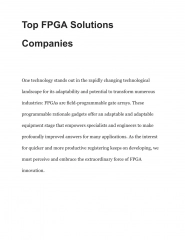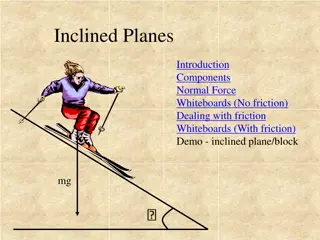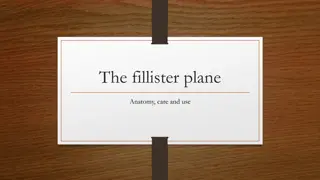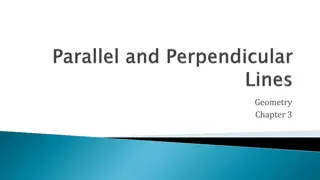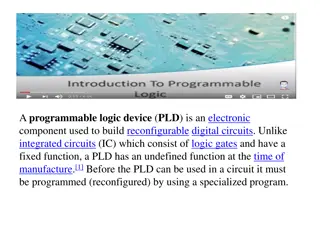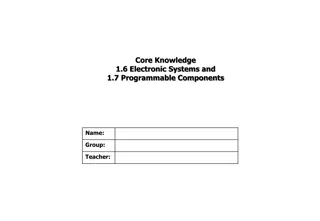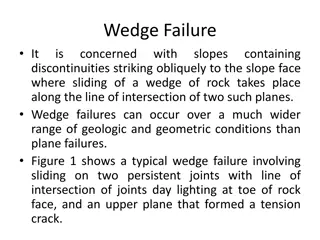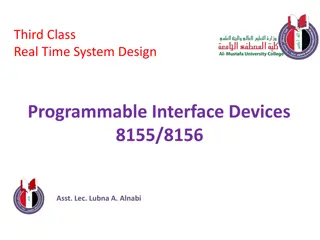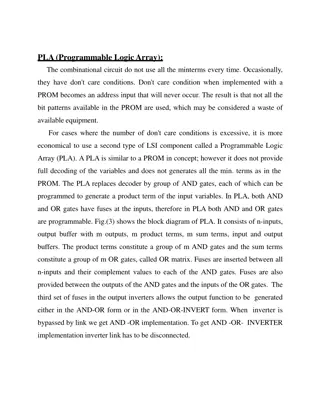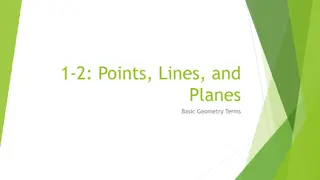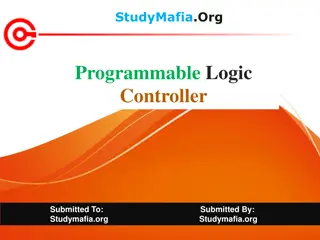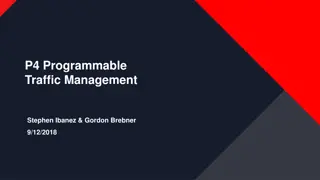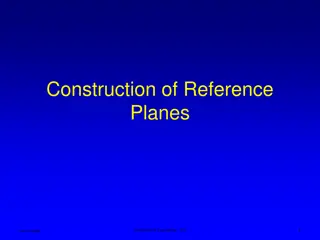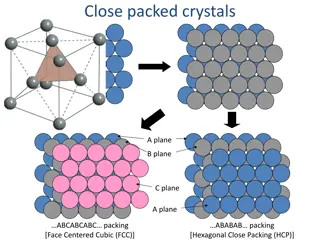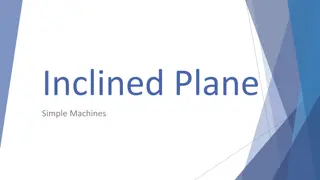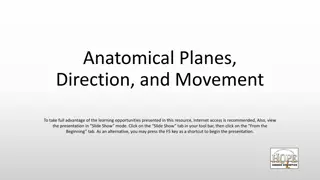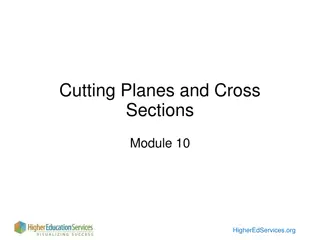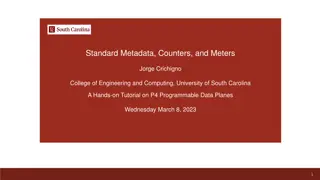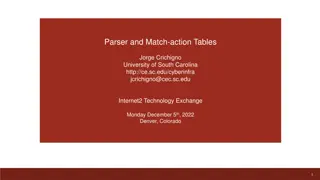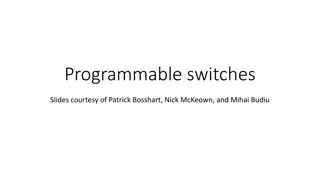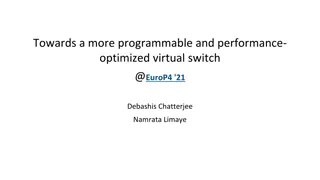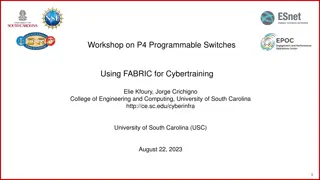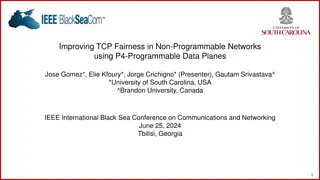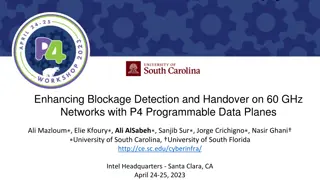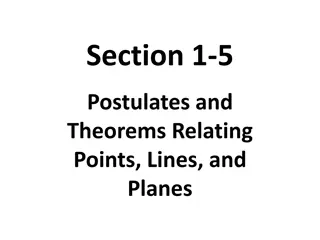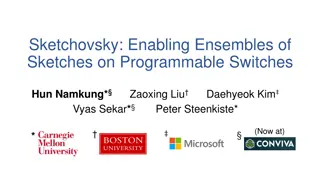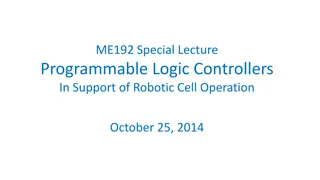Top FPGA Solutions Companies
In the rapidly evolving technological landscape, one technology stands out for its versatility and potential to revolutionize various industries: Field-Programmable Gate Arrays (FPGAs). These programmable logic devices offer a flexible and customizable hardware platform that enables engineers and de
1 views • 1 slides
Audiobook⚡ Rocketing Into the Future: The History and Technology of Rocket Plane
\"COPY LINK HERE ; https:\/\/getpdf.readbooks.link\/B00DGEQHQS\n\n[READ DOWNLOAD] Rocketing Into the Future: The History and Technology of Rocket Planes (Springer Praxis Books) | Rocketing Into the Future: The History and Technology of Rocket Planes (Springer Praxis Books)\n\"\n
1 views • 6 slides
Virtual Labs on SDN and P4 Programmable Switches
Explore the motivation behind Software-Defined Networking (SDN) and P4 programmable switches, highlighting the shift from traditional networking to more flexible and innovative approaches. Understand how SDN challenges protocol ossification, separates control and data planes, and enables packet-forw
2 views • 47 slides
Understanding Inclined Planes and Friction Forces
Introduction to inclined planes, components of forces, dealing with friction on whiteboards, and demonstrations on block forces on inclined planes. Learn about calculating components of gravity, friction forces, and scenarios involving kinetic and static friction on an inclined plane.
3 views • 11 slides
Understanding Hoop Stresses and Principal Stresses in Thin Cylindrical Shells
Explanation of principal planes and stresses in thin cylindrical shells, defining concepts such as principal planes, principal stresses, major principal stress, minor principal stress, major principal plane, and minor principal plane. Detailed explanation of hoop stress (circumferential stress) and
1 views • 8 slides
Comprehensive Guide to Fillister Planes: Anatomy, Care, and Use
This detailed resource covers the anatomy, care, and usage of fillister planes, a type of rebate plane used for cutting accurate rebates. Learn about different models, how to set up and maintain a fillister plane, and its versatile applications in woodworking. Explore images illustrating key compone
3 views • 20 slides
Comprehensive Overview of Geometry Chapter 3 Concepts
Dive into the fundamentals of lines, planes, parallelism, and angles in Geometry Chapter 3. Explore topics such as identifying lines and planes, understanding parallel and perpendicular lines, and recognizing angle relationships formed by transversals. Discover the properties of parallel lines, tran
0 views • 42 slides
Understanding Frictional Forces and Equilibrium Principles in Physics
Explore the concepts of frictional forces and equilibrium in physics with a focus on conditions for forces acting on a body associated with friction. Learn about limiting frictional force, coefficient of friction, and the equilibrium of a body on horizontal and inclined planes. Delve into scenarios
2 views • 9 slides
Understanding Programmable Logic Devices (PLD) in Digital Electronics
Programmable Logic Devices (PLDs) are versatile electronic components used to create reconfigurable digital circuits, distinct from fixed-function integrated circuits. PLDs require programming before use, enabling customization for specific functions. This article explores PLDs, digital electronic s
0 views • 10 slides
Understanding Skew Lines and Planes in 3D Geometry
Explore the concepts of skew lines, parallel lines, perpendicular lines, and planes in 3D geometry through real-life examples and equations. Learn about the shortest distance between skew lines and solve problems related to their applications.
1 views • 46 slides
Understanding Electronic Systems and Programmable Components
Dive into the world of electronic systems and programmable components by exploring key terms, sensors like Light Dependent Resistor and Thermistor, control devices, circuit components, and flow charts. Learn about inputs, outputs, feedback loops, and how to design simple routines for controlling out
1 views • 6 slides
Understanding Wedge Failures in Geotechnical Engineering
Wedge failures in geotechnical engineering occur when slopes with discontinuities experience sliding along the line of intersection of two planes. This type of failure can happen under various geological and geometric conditions and involves specific criteria such as the dip of the intersecting plan
0 views • 13 slides
Programmable Interface Devices 8155/8156 Overview and Design Considerations
Explore the capabilities of programmable interface devices 8155/8156 for interfacing I/O devices to microprocessors. Learn about their features, block diagrams, control signals, and address determination. Discover how to design interfacing circuits for reading data from A/D converters using the 8155
0 views • 10 slides
Understanding Programmable Logic Arrays (PLA)
Programmable Logic Arrays (PLAs) provide a flexible way to implement combinational circuits with don't care conditions efficiently. PLAs use programmable AND and OR gates to generate product terms, offering a more economical solution compared to PROMs for circuits with excessive don't care condition
0 views • 19 slides
Understanding Basic Geometry Terms: Points, Lines, and Planes
Discover the fundamental concepts in geometry such as points, lines, and planes, which serve as the foundation for defining other geometric figures. Explore the definitions of these terms, their properties, and how they are used to construct various shapes. Dive into the importance of undefined term
0 views • 12 slides
Understanding Programmable Logic Controllers (PLC)
Programmable Logic Controllers (PLCs) are tiny computers used to control system functions with programmed logic. They receive inputs and provide operating instructions to automate processes in various industries. PLCs have replaced manual relay-based systems and are essential in industrial control t
0 views • 24 slides
Understanding Programmable Traffic Management for Network Optimization
Programmable Traffic Management involves packet scheduling, traffic shaping, policing, drop policies, packet buffering, replication, and classification to optimize network performance. It is used in integrated switch architectures and is crucial for addressing diverse traffic characteristics and req
0 views • 66 slides
Understanding Points, Lines, and Planes in Geometry
Explore the fundamental concepts of points, lines, and planes in geometry. Learn how to name them, identify collinear points and coplanar elements, understand segments and rays, and delve into the intersections of planes through postulates. Enhance your geometric knowledge with clear definitions, di
0 views • 19 slides
Introduction to Construction of Reference Planes in Engineering
Explore the process of constructing reference planes in engineering, including principal planes, creating reference planes, reference features, and how to uniquely define a plane. Reference planes are essential for creating new sketches and carrying out feature operations in engineering design.
0 views • 12 slides
Understanding Crystal Lattice Planes and Indices
Exploring the significance of crystal lattice planes in determining parameters, diffraction methods, and orthogonal systems. Discover how to identify planes and calculate distances in various lattices using Miller indices. Visual aids provide clarity on hexagonal structures and symmetry in crystallo
0 views • 22 slides
Understanding Plane Surfaces in Engineering Drawings
Exploring the concept of plane surfaces in technical drawings, this informative content covers the definition, characteristics, and positioning of planes in space relative to projection planes. It also delves into the projections of various plane surfaces parallel, perpendicular, and inclined to pri
0 views • 9 slides
Understanding Inclined Planes: Simple Machines that Make Work Easier
Inclined planes are simple machines that help move heavy objects up a certain height by spreading out the force needed to move them. By creating a ramp where one side is higher than the other, objects can be moved up or down with less effort. Examples of inclined planes in daily life include ramps,
0 views • 13 slides
Understanding Anatomical Planes, Directions, and Movement in Human Body
Explore the fundamentals of anatomical planes, direction, and movement in the human body. Learn about the three cardinal planes of motion, anatomical positions, directions, and their significance in describing body structures and movements. Gain insights into the anatomical position and how it relat
1 views • 35 slides
Understanding Cutting Planes and Cross Sections in Module 10
Explore the concept of cutting planes and cross sections in Module 10 of HigherEdServices.org. Learn how cutting planes create cross-sections of objects, producing 2-D shapes, and discover the varying shapes of cross-sections based on plane orientation. Work through software modules and homework to
0 views • 9 slides
Workshop on Fine-grained Measurements App with P4 Programmable Switches
Explore the world of P4 programmable switches in a workshop hosted by the University of South Carolina. Learn about P4, programmable data plane switches, packet parsing, queue monitoring, and applications with P4 switches. Discover the shift from traditional networking to SDN, overcoming limitations
1 views • 19 slides
Understanding Standard Metadata, Counters, and Meters in P4 Programmable Data Planes
Learn about the role of metadata in packet processing, the significance of intrinsic metadata, and how to utilize custom headers for monitoring switch queues in P4 programmable data planes. This tutorial explores the V1 Model standard metadata and provides hands-on experience in defining and using c
0 views • 21 slides
Programmable Parser and Header Definitions at University of South Carolina
Programmable parsers and custom header definitions play a crucial role in network packet processing. This presentation by Jorge Crichigno at the University of South Carolina covers topics such as parser operation, predefined states, and header formats. The content delves into the capabilities of pro
1 views • 22 slides
Evolution of Programmable Switches and Routers
Explore the evolution of programmable switches and routers, from early attempts at programmability to the introduction of the P4 programming language and Software Defined Networking (SDN). Discover the shift towards greater customization and control in network infrastructure, leading to the developm
0 views • 40 slides
Effective Fuzz Testing for Programmable Logic Controllers - Research for Nuclear Safety
This paper discusses the significance of fuzz testing for Programmable Logic Controllers (PLCs) to ensure nuclear safety, citing incidents like the Stuxnet worm attack. It delves into the methodology, zero-day vulnerability findings, and results of the research conducted by authors in February 2020,
1 views • 11 slides
Towards a More Programmable and Performance-Optimized Virtual Switch @ EuroP4 '21
This presentation discusses the development of a more programmable and performance-optimized virtual switch at EuroP4 '21. It covers topics such as P4 with OVS, challenges in OVS hardware offload, P4 enhanced Open vSwitch, P4 components in OVS, stacked pipelines, and various control and data planes
0 views • 10 slides
Workshop on P4 Programmable Switches Using FABRIC for Cybertraining - University of South Carolina
Explore the world of P4 programmable switches and FABRIC infrastructure for cybertraining at the University of South Carolina. Discover the FABRIC testbed, cybertraining opportunities, organization of labs, and hands-on labs focusing on P4 programmable data planes over FABRIC. Enhance your knowledge
0 views • 13 slides
Enhancing TCP Fairness Using P4-Programmable Data Planes
This study presents a solution to improve TCP fairness in non-programmable networks by utilizing P4-programmable data planes. It addresses unfair bandwidth distribution issues in TCP traffic and proposes a system that leverages P4 switches for passive traffic monitoring and RTT computation.
0 views • 24 slides
Enhancing Blockage Detection and Handover on 60 GHz Networks with P4 Programmable Data Planes
The study presents a system using programmable switches to monitor packet inter-arrival time for blockage detection on mmWave networks. Results show fast recovery speeds and minimal impact on flow completion time, with contributions focusing on leveraging programmable switches and real device scenar
0 views • 7 slides
Geometric Postulates and Theorems Relating Points, Lines, and Planes
This section introduces the postulates and theorems related to points, lines, and planes in geometry. It covers basic assumptions, postulates about lines and planes, and theorems about intersections. The concept of "exactly one" and "one and only one" is emphasized, highlighting the unique relations
0 views • 10 slides
Broadband Access Points & Programmable Logic Controllers Replacement Phase 1 Project Overview
This project overview provides details of the Broadband Access Points & Programmable Logic Controllers Replacement Phase 1 Project led by Jeff Ray, EIT Project Engineer at Treatment & Recycle Engineering. It includes information on the pre-submittal conference, RFQ schedule, evaluation criteria, and
0 views • 13 slides
Sketchovsky: Enabling Sketch Ensembles on Programmable Switches
Network measurement plays a crucial role in management tasks such as port scan detection and resource provisioning. The concept of sketch ensembles on programmable switches shows promise in addressing key challenges related to control and data plane operations. This approach offers a way to efficien
2 views • 20 slides
Enhancing Efficiency in Sketch-based Monitoring for Programmable Switches
SketchLib introduces advancements in sketching algorithms to enable efficient monitoring on programmable switches. The tool bridges gaps between existing sketches for CPUs and programmable switches, offering resource optimizations and API calls to enhance performance and reduce resource consumption
0 views • 20 slides
NetLogo - Programmable Modeling Environment for Simulating Natural and Social Phenomena
NetLogo is a powerful and versatile programmable modeling environment created by Uri Wilensky in 1999. It allows users to simulate natural and social phenomena by giving instructions to multiple agents operating independently, making it ideal for modeling complex systems evolving over time. NetLogo
0 views • 7 slides
Understanding Programmable Logic Controllers (PLCs) in Robotic Cell Operations
Programmable Logic Controllers (PLCs) are versatile devices used in various industries for automation and control processes. This article explores the functionality and applications of PLCs in supporting robotic cell operations, emphasizing their role in conveyor control, multi-robot workstations, a
0 views • 15 slides
Importance of Multiple Planes in Single-Phase LArTPC
Exploring the necessity of having 4 planes in a single-phase LArTPC for optimal data collection and reduction of ambiguities through detailed analysis using Toy MC simulations. The study showcases how the number of planes significantly impacts the accuracy and efficiency of hit detection in LArTPC d
0 views • 28 slides
